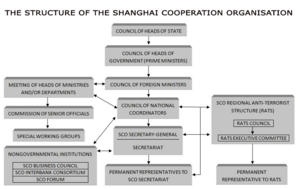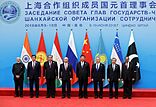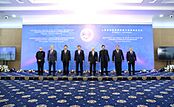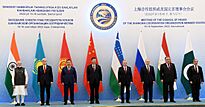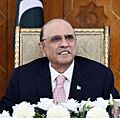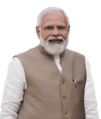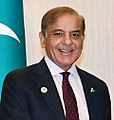Shanghai Cooperation Organisation facts for kids
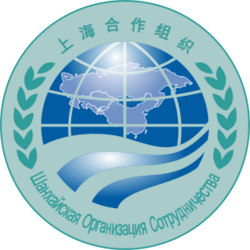 |
|

Members Observers Dialogue partners
|
|
| Abbreviation | SCO |
|---|---|
| Predecessor | Shanghai Five |
| Formation | 15 June 2001 |
| Type | Mutual security, political, and economic cooperation |
| Legal status | Regional cooperation forum |
| Headquarters | Beijing, China (Secretariat) Tashkent, Uzbekistan (RATS Executive Committee) |
|
Membership
|
10 member states
2 observer states
14 dialogue partners
4 guest attendees
|
|
Official language
|
|
|
Secretary-General
|
Nurlan Yermekbayev |
|
Deputy Secretaries-General
|
|
|
RATS
Executive Committee Director |
Ruslan Erkinovich Mirzaev |
The Shanghai Cooperation Organisation (SCO) is a large group of countries in Eurasia. These countries work together on important topics like safety, money, and international relations. It started in 2001 with six countries: China, Kazakhstan, Kyrgyzstan, Russia, Tajikistan, and Uzbekistan.
Later, India and Pakistan joined in 2017. Iran became a member in 2023, and Belarus joined in 2024. Many other countries are also involved as observers or partners.
The SCO is the biggest regional group in the world by land area and population. It covers about 24% of the Earth's total land and includes 42% of the world's people. This means a huge part of the world's population lives in SCO member countries.
The SCO grew out of an earlier group called the Shanghai Five, which formed in 1996. The leaders of these countries decided to create a new, stronger organization in 2001. The main decisions for the SCO are made by the Heads of State Council, which meets once a year. The group also has a special part called the Regional Anti-Terrorist Structure (RATS) that helps fight crime.
Contents
How the SCO Started
The Shanghai Five Group
The Shanghai Five group began on April 26, 1996. Leaders from China, Kazakhstan, Kyrgyzstan, Russia, and Tajikistan signed an agreement in Shanghai. This agreement was about building trust between their militaries in border areas.
A year later, on April 24, 1997, the same countries signed another agreement in Moscow. This one was about reducing military forces near their borders. On May 20, 1997, the presidents of Russia and China also signed a statement. They talked about a "multipolar world", meaning a world where power is shared among many countries, not just one or two.
The Shanghai Five leaders met every year. They met in Almaty, Bishkek, and Dushanbe. At the Dushanbe meeting, they agreed to respect each other's independence. They also promised to support each other in keeping their countries stable and safe. This group helped them solve border problems and work together on security issues.
Becoming a Formal Organization
In 2001, the yearly meeting returned to Shanghai. This time, the group became a formal organization. They first welcomed Uzbekistan into the group. On June 15, 2001, all six leaders signed the Declaration of Shanghai Cooperation Organisation. This document praised the work of the Shanghai Five and aimed for even closer cooperation. From 2001 to 2008, the SCO grew quickly. It created many permanent groups and special projects to deal with economic and security matters.
In June 2002, the SCO leaders met in Saint Petersburg, Russia. They signed the SCO Charter, which explained the organization's goals, rules, and how it would work. This charter became official on September 19, 2003.
In July 2005, at a meeting in Astana, Kazakhstan, representatives from India, Iran, Mongolia, and Pakistan attended for the first time. The president of Kazakhstan, Nursultan Nazarbayev, said that the leaders at the table represented "half of humanity."
By 2007, the SCO had started over twenty big projects. These projects were about transportation, energy, and communication. The organization also held regular meetings for officials from member countries. These officials discussed security, military, economic, and cultural topics.
In July 2015, in Ufa, Russia, the SCO decided to invite India and Pakistan to become full members. In June 2016, in Tashkent, both countries signed agreements to start the joining process. In June 2017, at a meeting in Kazakhstan, India and Pakistan officially became full members of the SCO.
The SCO has also built relationships with other international groups. These include the United Nations, Association of Southeast Asian Nations (ASEAN), and the African Union.
How the SCO is Organized
The Council of Heads of State is the top decision-making group in the SCO. They meet once a year in one of the member countries' capital cities. The prime ministers of countries like India and Pakistan attend these meetings. This is because their roles are similar to the presidents of other SCO nations.
As of July 4, 2024, the Council of Heads of State includes:
- Aleksandr Lukashenko (Belarus)
- Xi Jinping (China)
- Narendra Modi (India)
- Masoud Pezeshkian (Iran)
- Kassym-Jomart Tokayev (Kazakhstan)
- Sadyr Japarov (Kyrgyzstan)
- Shehbaz Sharif (Pakistan)
- Vladimir Putin (Russia)
- Emomali Rahmon (Tajikistan)
- Shavkat Mirziyoyev (Uzbekistan)
The Council of Heads of Government is the second-highest group. They also meet every year to discuss cooperation and approve the SCO's budget. As of November 1, 2022, this council includes:
- Aleksandr Turchin (Belarus)
- Li Qiang (China)
- Narendra Modi (India) (often sends a deputy)
- Alihan Smaiylov (Kazakhstan)
- Akylbek Japarov (Kyrgyzstan)
- Shehbaz Sharif (Pakistan) (often sends a deputy)
- Mikhail Mishustin (Russia)
- Qohir Rasulzoda (Tajikistan)
- Abdulla Aripov (Uzbekistan)
The Council of Foreign Ministers also meets regularly. They talk about international events and how to work with other organizations. The Council of National Coordinators helps member states work together based on the SCO's rules.
The SCO has a main office called the Secretariat in Beijing, China. This office carries out the organization's decisions. It also prepares documents, stores records, and shares information about the SCO. The SCO Secretary-General leads the Secretariat for a three-year term. Zhang Ming from China became the Secretary-General on January 1, 2022.
The Regional Anti-Terrorist Structure (RATS) Executive Committee is in Tashkent, Uzbekistan. This group helps member countries work together to fight against terrorism, separatism (groups wanting to break away from a country), and extremism (holding extreme views). The Director of RATS is chosen for a three-year term. Ruslan Mirzaev from Uzbekistan became the Director on January 1, 2022. Each member country also sends a representative to RATS.
The official languages of the SCO are Chinese and Russian.
The SCO also has a youth group called the Score Foundation.
SCO Members
Member Countries
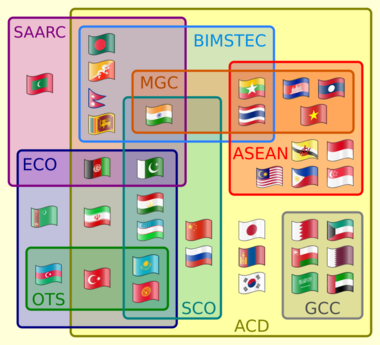
| Country | Joined as Member |
|---|---|
| 15 June 2001 | |
| 15 June 2001 | |
| 15 June 2001 | |
| 15 June 2001 | |
| 15 June 2001 | |
| 15 June 2001 | |
| 9 June 2017 | |
| 9 June 2017 | |
| 4 July 2023 | |
| 4 July 2024 |
Observer Countries
These countries attend SCO meetings but are not full members.
| Country | Observer Status Granted |
|---|---|
| 2004 | |
| 7 June 2012 (Currently inactive) |
Dialogue Partners
Dialogue partners are countries that work with the SCO on specific topics. This status was created in 2008.
| Country | Status Granted |
|---|---|
| 6 May 2010 | |
| 26 April 2013 | |
| 24 September 2015 | |
| 14 March 2016 | |
| 22 March 2016 | |
| 16 April 2016 | |
| 14 September 2022 | |
| 14 September 2022 | |
| 14 September 2022 | |
| 5 May 2023 | |
| 5 May 2023 | |
| 5 May 2023 | |
| 5 May 2023 | |
| 15 July 2023 |
Guest Attendees
Some international organizations and one country are invited to attend SCO meetings as guests.
 Association of Southeast Asian Nations (ASEAN)
Association of Southeast Asian Nations (ASEAN) Commonwealth of Independent States (CIS)
Commonwealth of Independent States (CIS) Turkmenistan
Turkmenistan United Nations (UN)
United Nations (UN)
Turkmenistan has said it is a neutral country. This means it usually does not join military groups. However, Turkmenistan's leader has attended SCO meetings since 2007 as a guest.
Future Membership
Some countries have shown interest in joining the SCO or becoming partners.
| Country | Status Applied For | Date |
|---|---|---|
| Observer | 2012 | |
| Dialogue partner | 2015 | |
| Dialogue partner | 2016 | |
| Dialogue partner | 2019 | |
| Observer | July 2023 | |
| Dialogue partner | 2024 |
In 2010, the SCO created a way for new members to join. Turkey became a dialogue partner in 2013. Turkey's president has talked about the idea of Turkey becoming a full SCO member. This was discussed again in 2022.
Azerbaijan expects to become an observer. The President of Kazakhstan said in July 2024 that Azerbaijan might become a full member soon.
What the SCO Does
Working Together on Security
The SCO mainly focuses on security. It works to fight against terrorism, separatism (groups trying to break away from a country), and extremism (extreme beliefs). It also tries to stop weapons trading. The SCO has created lists of suspected terrorists.
In June 2004, the Regional Anti-Terrorist Structure (RATS) was set up in Tashkent. In October 2007, the SCO and another group, the Collective Security Treaty Organization (CSTO), agreed to work more closely. They decided to cooperate on security and crime.
The SCO also works against cyberwarfare. This is when countries use computers to attack or harm other countries. The SCO believes that spreading harmful information to other countries is a security threat. In 2017, it was reported that RATS had stopped 600 terror plots and helped return 500 terrorists. In 2021, RATS decided to hold a joint anti-terror exercise in Pakistan.
At a meeting in Astana, Kazakhstan, in July 2024, the SCO called for a fair world order. They want a world where power is shared and countries work together peacefully.
Military Activities

The SCO's activities also include military cooperation and sharing information. However, SCO leaders have often said that the SCO is not a military alliance.
The SCO has not provided military help in real conflicts. But, since 2017, member countries have regularly held military exercises. These exercises help them work together against terrorism and other threats. They also help keep peace in the region.
The first joint military exercise was in 2003, in Kazakhstan and China. Since then, China and Russia have held large military games together. These include "Peace Mission 2005," "Peace Mission 2007," and "Peace Mission 2009." In 2007, over 4,000 soldiers took part in "Peace Mission 2007" in Russia. In 2010, more than 5,000 soldiers from China, Russia, Kazakhstan, Kyrgyzstan, and Tajikistan took part in "Peace Mission 2010."
The SCO has also been a place for countries to make big military announcements. For example, during the 2007 military games in Russia, President Vladimir Putin announced that Russian strategic bombers would start regular long-range flights again. This was the first time since the Cold War.
In June 2014, there was an idea to combine the SCO with the Collective Security Treaty Organization. However, many SCO members have kept their distance from military cooperation with Russia.
Economic Cooperation
In September 2003, SCO member countries signed an agreement to improve economic cooperation. China's Premier, Wen Jiabao, suggested creating a free trade area within the SCO. This would make it easier for goods to move between countries. A plan with 100 specific actions was signed in September 2004.
In October 2005, the SCO said it would focus on joint energy projects. This includes oil, gas, and water resources. They also agreed to create the SCO Interbank Consortium to help fund these projects. In February 2006, the first meeting of this banking group was held in Beijing.
In June 2009, at a meeting in Yekaterinburg, China offered a US$10 billion loan to other SCO member countries. This was to help their economies during the 2008 financial crisis.
In 2014, the Eurasian Economic Union was formed. Russia, Kazakhstan, and Kyrgyzstan are members of both the SCO and this union.
In 2019, Pakistan's Prime Minister Imran Khan suggested that SCO countries trade using their own currencies instead of US dollars. He also proposed setting up an SCO bank. In June 2022, Iran suggested creating a single SCO currency to make trade easier.
The SCO also has a successful student exchange program called the SCO University.
Cultural Cooperation
The culture ministers of the SCO countries met for the first time in Beijing in April 2002. They signed a statement to continue working together on cultural projects.
An SCO Arts Festival and Exhibition was held for the first time in 2005. Kazakhstan suggested holding an SCO folk dance festival in 2008.
SCO+ Forum
The SCO+ forum is a special meeting format started in October 2020. It brings together political parties from SCO countries, observer states, and other groups like the Commonwealth of Independent States (CIS) and BRICS countries.
The first SCO+ forum was held in October 2020. It focused on "Economy for People." Speakers from 25 countries attended, including high-ranking officials and diplomats.
SCO Meetings
The leaders of the SCO countries meet every year. The location of these meetings changes, following the alphabetical order of the member countries' names in Russian. The prime ministers also meet once a year. The foreign ministers usually meet a month before the main leaders' summit.
List of Summits
| Date | Country | Location |
|---|---|---|
| 14–15 June 2001 | Shanghai | |
| 7 June 2002 | Saint Petersburg | |
| 29 May 2003 | Moscow | |
| 17 June 2004 | Tashkent | |
| 5 July 2005 | Astana | |
| 15 June 2006 | Shanghai | |
| 16 August 2007 | Bishkek | |
| 28 August 2008 | Dushanbe | |
| 15–16 June 2009 | Yekaterinburg | |
| 10–11 June 2010 | Tashkent | |
| 14–15 June 2011 | Astana | |
| 6–7 June 2012 | Beijing | |
| 13 September 2013 | Bishkek | |
| 11–12 September 2014 | Dushanbe | |
| 9–10 July 2015 | Ufa | |
| 23–24 June 2016 | Tashkent | |
| 8–9 June 2017 | Astana | |
| 9–10 June 2018 | Qingdao | |
| 14–15 June 2019 | Bishkek | |
| 10 November 2020 | videoconference | |
| 16–17 September 2021 | Dushanbe | |
| 15–16 September 2022 | Samarkand | |
| 4 July 2023 | videoconference | |
| 3–4 July 2024 | Astana | |
| Fall 2025 | Tianjin |
| Date | Country | Location |
|---|---|---|
| 14 September 2001 | Almaty | |
| 23 September 2003 | Beijing | |
| 23 September 2004 | Bishkek | |
| 26 October 2005 | Moscow | |
| 15 September 2006 | Dushanbe | |
| 2 November 2007 | Tashkent | |
| 30 October 2008 | Astana | |
| 14 October 2009 | Beijing | |
| 25 November 2010 | Dushanbe | |
| 7 November 2011 | Saint Petersburg | |
| 5 December 2012 | Bishkek | |
| 29 November 2013 | Tashkent | |
| 14–15 December 2014 | Astana | |
| 14–15 December 2015 | Zhengzhou | |
| 2–3 November 2016 | Bishkek | |
| 30 November 2017 | Sochi | |
| 11–12 October 2018 | Dushanbe | |
| 1–2 November 2019 | Tashkent | |
| 30 November 2020 | videoconference | |
| 25 November 2021 | videoconference | |
| 1 November 2022 | videoconference | |
| 26 Oсtober 2023 | Bishkek | |
| 15–16 October 2024 | Islamabad | |
| 2025 | TBA |
Images for kids
-
 Republic of Belarus
Republic of Belarus
Aleksandr Turchin
Prime Minister of Belarus -
 Islamic Republic of Iran
Islamic Republic of Iran
Mohammad Reza Aref
First Vice President of Iran
See also
 In Spanish: Organización de Cooperación de Shanghái para niños
In Spanish: Organización de Cooperación de Shanghái para niños
- Asia Cooperation Dialogue
- Asia–Europe Meeting
- Association of Southeast Asian Nations
- Belt and Road Initiative
- Bay of Bengal Initiative for Multi-Sectoral Technical and Economic Cooperation
- Collective Security Treaty Organization
- Conference on Interaction and Confidence-Building Measures in Asia
- Continental union
- Eurasian Economic Union
- Eurasianism
- Global East
- South Asian Association for Regional Cooperation
 | John T. Biggers |
 | Thomas Blackshear |
 | Mark Bradford |
 | Beverly Buchanan |


